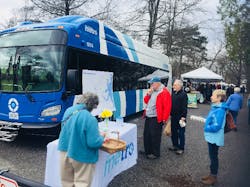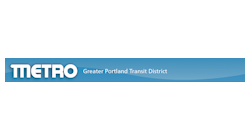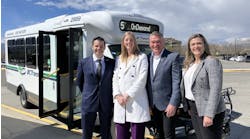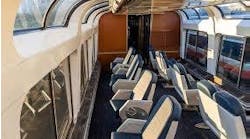Greater Portland METRO unveiled new, 40-foot low floor buses with modern, friendly features reflecting the agency’s vision of a more sustainable future.
One of the new buses was on view at the Portland Farmers’ Market at Deering Oaks Park over the weekend, where visitors stopped by to get a closer look and meet with METRO staff.
Eleven buses are being delivered through May 2018. Eight of these buses will support Metro’s “Transit West” expansion, set to launch on August 27, 2018. Three of the new buses will replace vehicles that are over 20 years old. These eleven buses will be seen throughout the region over the next few months as they go through testing and bus operator training. The buses will be phased into passenger service between early July and August 27, 2018.
Five of the eleven buses are powered by Compressed Natural Gas (CNG). Six are powered by ultra-low sulfur diesel and include the latest emission control technology, which reduces air quality impacts. Up to thirteen additional buses will be delivered in 2019 and 2020 which will replace vehicles that have exceeded their useful life. The new buses are larger with 40 seats, compared to 31-35 seats in Metro’s older buses. The new buses feature two to three wheelchair positions, space for three bikes, Wi-Fi, additional security cameras, and in-seat USB ports. The interior cabin will be brighter due to stainless steel stanchions and panels, lighter colors for floors and panels, vibrant and colorful (and comfortable) seating, and clear emergency hatches. All buses are equipped with “real time” arrival information.
The updated paint scheme is a key element of Metro’s rebranding campaign, which also includes a new logo and color scheme, updated bus stop signs, an improved website, and many other enhancements. Along with upcoming service improvements, the new logo and paint scheme are intended to signal that the Metro transit system is modernizing, effective at solving people’s mobility needs and a strong community asset.
“We are excited about the larger buses, new customer amenities, modern branding and the expanded service coming later this year. Public transportation plays a vital role in our region’s mobility, economic development and quality of life,” says Greater Portland METRO General Manager Greg Jordan. “A strong transit system that works, stands out and meets the modern customer’s demands is the necessary ingredient for urban and suburban development built more around people and less around cars.”
Metro’s Transit West expansion launches August 27, 2018 and includes the following:
• The new Husky Line will connect the communities of Portland, Westbrook, Gorham as well as the two USM campuses, with a limited stop, higher speed bus route.
• The new Route 3 will directly connect Westbrook to South Portland and northwest Portland and provide new service to Westbrook Community Center, new housing along Spring Street in Westbrook, Husson University, and South Portland’s Target Plaza on Running Hill Rd.
• Restructuring the current Route 2 (Forest) and Route 4 (Brighton) to be more direct, simple and efficient.
• A Transit Pass Program with the University of Southern Maine (USM) will provide free access to the Metro transit network for students, staff and faculty.
• Bus stop improvements will be made at 30-35 sites across the Metro system which includes pedestrian and ADA improvements and bus shelters at 15-20 locations.
The buses are manufactured by New Flyer Industries. Following a 2016 competitive procurement, Metro awarded a contract to New Flyer for the production of nineteen (19) expansion and replacement buses with options to purchase an additional seven. For the first eleven buses, the diesel bus cost is $490,382 per unit while the CNG bus cost is $507,759 per unit. An analysis of data compiled by the American Public Transportation Association indicates that for 40-foot buses built in 2017-18, the average diesel bus cost is $486,724 and the average CNG bus cost is $525,642. Funding for the buses comes from federal grants which will cover 85 percent of the cost. The remaining 15 percent is covered by local sources of funding including revenue from fares, advertising, and state and local assistance.




